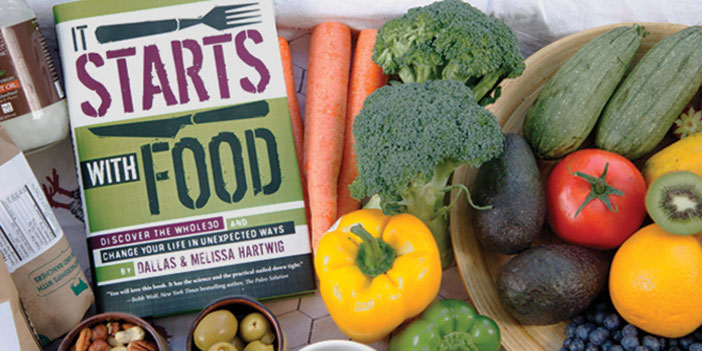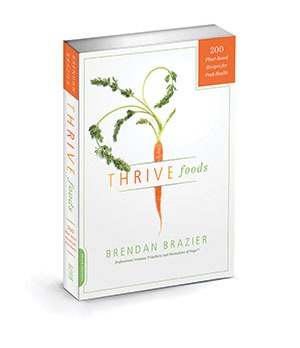Popular diet philosophies often directly contradict each other. Can any of them back up the benefits they promise with real research?
Grains are killing you slowly! Whole grains are the key to weight loss! Meat helps build muscle! Meat is murder! With so much conflicting nutritional advice, it can be a real challenge deciding which suggestions are worth trying and which are nothing but scientific–sounding sales pitches. Here, we take a look at four popular diet philosophies to see what each can—and can’t—offer the nutrition–conscious athlete.
Paleo
The Diet: Meats, fruits, non–starchy veggies, honey, fish, eggs—basically anything our cave–dwelling ancestors could have tracked down or stumbled across. No dairy, grains, legumes, or refined sugar allowed! Hugely popular with CrossFitters and other hardcore gym types.
The Promise: Choosing foods your body is adapted to means fewer problems with modern health woes such as obesity, inflammation, or heart disease.
The Facts: Stone Age menus were as varied as the environments our ancestors lived in, so there’s no one real “paleo diet.” Many nutritionists look askance at paleo’s sky–high protein and fat content at the expense of complex carbohydrates from foods like whole grains. However, lean meats and veggies are hard to fault as the basis for any diet. Even if you’d never make it as a paleo purist, the basic notion of filling your plate with lean proteins and seasonal veggies remains nutritionally sound.
Try It: Prep your own paleo–friendly meals with healthy, seasonal ingredients from Liberty Heights Fresh (libertyheightsfresh.com). For $64 a week, you’ll get a bag packed with locally grown and raised produce, meats, and eggs all guaranteed compatible with the paleo lifestyle.
Or, for a twist on paleo with a specific weight–loss focus, try the Whole30 (whole30.com). Created by Utah residents Dallas and Melissa Hartwig, this program eliminates potentially problematic foods like sweeteners, dairy, grains, and legumes, replacing them with meat, eggs, seafood, and vegetables (lots and lots of vegetables) for a 30–day “nutritional reset.” Another twist: You’ve got to stay off the scale for the program’s duration—no weight checks! Successful Whole30 completers say they’ve experienced more energy, fewer unhealthy food cravings, and relief from symptoms of a variety of health conditions in addition to their impressive weight loss.
Gluten–Free
The Diet: Anything goes…except foods containing gluten, the protein found in wheat and related grains barley and rye. People with celiac disease and wheat allergies have been sticking to this plan for decades.
The Promise: As described by sources like the bestselling book Wheat Belly, gluten and other grain proteins cause a constant low–level state of inflammation in the intestines, resulting in health woes ranging from acne to high blood pressure. Adherents claim they’ve seen clearer skin, more energy, and shrinking waistlines after going gluten–free.
The Facts: There’s no body of published, peer–reviewed evidence to support boosters’ claims. However, if you find that avoiding bread and cookies makes you feel better, consider asking your doctor to evaluate you for non–celiac gluten sensitivity. This innate immune response can cause symptoms such as stomach ache, foggy thinking, and numbness in the hands and feet.
Try It: For a gluten–free night on the town, look for restaurants that have been GIG (Gluten Intolerance Group) certified. Check out the locator at gluten.net/find–a–restaurants.
Vegan
The Diet: Whether for compassionate reasons or for better overall health, vegans eliminate all animal products (meat, eggs, dairy, and even honey) from their diets.
The Promise: Veganism sidesteps common health problems associated with consuming animal–based foods (especially fatty ones) such as obesity, high blood pressure, diabetes, and even certain cancers.
The Facts: While it’s possible to maintain peak performance on a vegan diet, serious athletes need to take special care to consume enough protein and fat. Incorporating plenty of soy, hemp, and legume products, plus healthy fats like olive oil and avocado, keeps energy levels high and recovery times short. Vegan athletes may also want to supplement with creatine, an energy–boosting molecule that’s absent from plant foods (though non–animal derived supplements are available).
Try It: For nutrient–dense, plant–based meals that don’t skimp on taste, check out the Thrive series of cookbooks by former pro Ironman Brendan Brazier (brendanbrazier.com).
Juice Cleansing
The Diet: Blends of fruits, vegetables, and sometimes supplements like protein powder replace all or most solid food for a period ranging from three to 60 days. Say goodbye to sweeteners, caffeine, and alcohol, too.
The Promise: Juice cleansing resets your digestive system by clearing out toxins, flooding your body with antioxidants and other nutrients, and retraining your taste buds to respond to healthy whole foods. Many juicing fans report losing impressive amounts of weight in a short time, too.
The Facts: While juicing may be a convenient way to boost your intake of fruits and veggies, there are no “toxins” built up in your digestive system to flush. (If you’re legitimately suffering from exposure to toxins like heavy metals, there’s no cleanse in the world that will clear those out.) And while you may drop a few pounds during your cleanse, that weight can creep back on as soon as you return to your normal diet. However, studies on calorie restriction and its link to longevity and disease prevention are quite promising. Plus, there’s no harm—and plenty of benefit—in consuming juice instead of a solid meal a few times a week. Look for veggie–heavy options that don’t include sweeteners or added ingredients like frozen yogurt.
Try It: Get your greens (or oranges, or purples) in raw, cold–pressed form from Vive Juicery (vivejuicery.com, locations in Salt Lake, Sugar House, and the Downtown Farmer’s Market). Try the Stella: a snappy blend of spinach, kale, cucumber, celery, green apple, and citrus.
Local delivery–based Just Organic Juices is an option for busy juicers who don’t have time to visit a local shop. Just visit JOJ’s website at justorganicjuice.com and select from a wide variety of fresh, organic juices or cleanse packs and have it dropped off anywhere in the Salt Lake City area for free. For pre– or post–workout, try the popular AlmondDelight, a creamy almond nut milk available with or without cacao. Need your juice fix now? Visit Just Organic Juice’s new shop at 2030 South 900 East in Sugarhouse to pick up juices or cleanses on the go.





